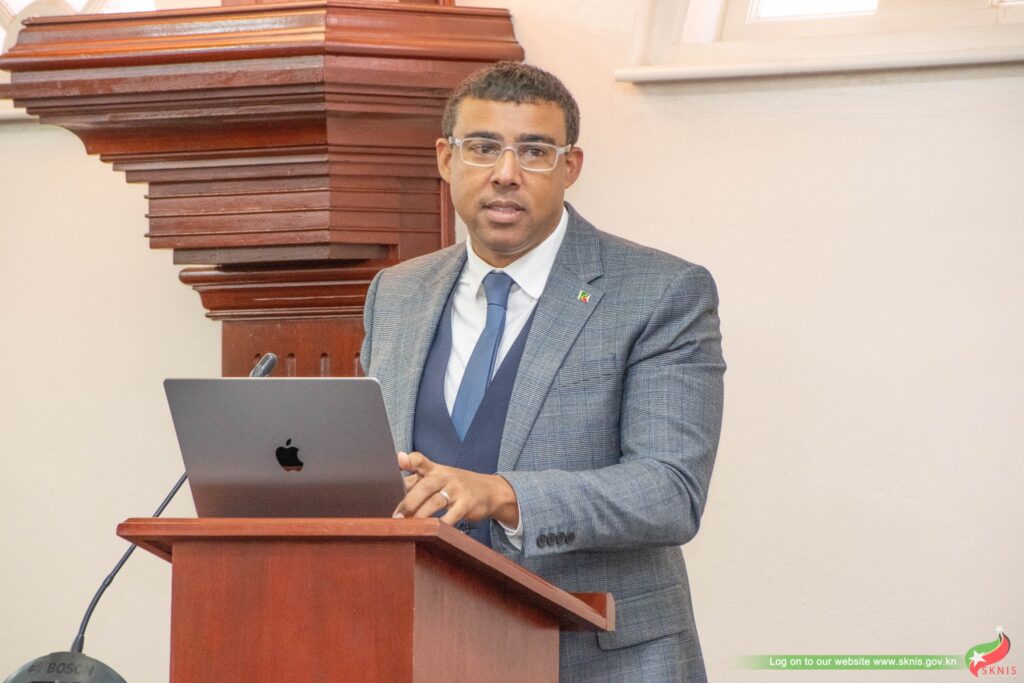Basseterre, Saint Kitts, July 24, 2025 (SKNIS): The National Assembly in Saint Kitts and Nevis, on Thursday, July 24, 2025, successfully passed the Judge Alone Trials (Amendment) Bill, 2025, further reinforcing the government’s commitment to modernising and strengthening the justice system in the Federation.
Attorney General (AG) and Minister of Justice and Legal Affairs, the Honourable Garth Wilkin, who led the debate on the Bill, described the amendments as a critical evolution of the Judge Alone Trials Act, No. 20 of 2024.
“This Amendment, Madame Speaker, is the precise and purposeful refinement and evolution of the Judge Alone Trials Act, No. 20 of 2024, which this Honourable House passed last year,” said Attorney General Wilkin. “It was informed by regional best practices and international benchmarks. However, as with all living instruments, real-world application exposed gaps, ambiguities, and the need for clearer guidance on discretion and fairness. This Amendment is our carefully calibrated response.”
According to AG Wilkin, since the original legislation came into force, 33 criminal cases have been completed in the High Court – 17 by guilty plea and only three by judge alone trials – representing less than 10 percent of cases. One high-profile murder case was salvaged from collapse through conversion to a judge alone trial after an unlawful attempt to influence a juror. Investigations into the incident are ongoing under the Justice Interference Prevention Act, 2024.
The amendments were presented as part of a wider regional and global movement to reduce case backlogs and promote more secure, efficient, and fair judicial proceedings. Jurisdictions such as Trinidad and Tobago, Jamaica, Belize, and others have already implemented similar reforms. The attorney general also referenced a government-commissioned review in England and Wales advocating for judge-led trials in response to severe delays and jury system pressures.
“Madame Speaker, I have heard some criticism about judge alone trials. But some people just talk for talking sake and ignore the facts,” the Attorney General stated. “The vast majority of criminal matters tried in Saint Kitts and Nevis are tried by judge alone, in the Magistrate’s Court… hundreds of serious firearm and drug offences were tried by judge alone… so we were already well accustomed to judge alone trials in the most active court.”
Among the key changes to the legislation is the clarification of procedures regarding when judge alone trials are mandatory, ensuring that judicial discretion is clearly defined and applied appropriately. The amendment also introduces the ability for the prosecution to apply for the inclusion of non-scheduled offences in a scheduled indictment, allowing the judge to determine whether the entire case should proceed without a jury in the interest of justice. Furthermore, the legislation expands the scope for either the prosecution or the defence to request a judge alone trial in non-scheduled matters, based on specific conditions such as the risk of jury tampering, undue trial delays, or case complexity.
To further safeguard the fairness and transparency of judicial proceedings, the amendment empowers judges to decline a judge-alone trial if it is believed to compromise fairness or the public interest, and it codifies the grounds on which a judge may recuse themselves, such as perceived bias or conflict of interest. Finally, the revised Schedule now focuses on the most serious crimes – specifically adding attempted murder and shooting with intent – which are often associated with higher risks of jury interference or public prejudice.
“The Judge Alone Trials (Amendment) Bill, 2025, is not an innovation for innovation’s sake,” Attorney General Wilkin added. “It is a precise response to operational lessons learned and principled concerns raised. It ensures that judge-alone trials – when used – are used with clarity, fairness, and accountability. It strengthens the Rule of Lawnd it fortifies our efforts to build a resilient, modern, and sustainable justice system.”
The attorney general underscored that jury trials will continue to play a prominent role, with approximately 70 percent of matters still expected to be heard before a jury.
This legislative achievement further cements the Federation’s position as a leader in criminal justice reform in the Caribbean. The attorney general was recently invited by the President of the Caribbean Court of Justice (CCJ) to deliver the keynote address on “Criminal Justice Reform” at the CCJ’s 8th Biennial Conference, in recognition of the Federation’s pioneering steps in strengthening judicial processes.
-30-



